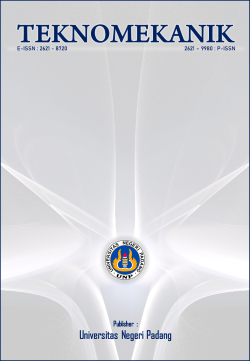Peer Review Guideline
The following questions should be considered before you accept or decline the review invitation:
- Is your expertise area relevant to the article? It must be relevant to ensure the best remark from you.
- Do you have any potential conflict of interest? If any, disclose to the editor.
- Is your time enough? Reviewers should commit to the deadline due to the review process is taking time.
Either accept or decline to review the article, please respond to the invitation soon. The slow response will delay the review process. Please suggest alternative reviewers if you decline the invitation.
Review Comment
The editor will evaluate your review as a reference for acceptance or decline of the article. Thus, your review must be constructive and objective in relation to the article. Despite this, your comments should be polite. The review process adheres to double-blind which means the reviewer should avoid remarks or any personal information.
You are also encouraged to provide the article’s deficiencies. The review must be written clearly so that both the author and the editor can comprehend your perspectives on remarks. You must also specify your review as a private matter or based on data contained in an article or other sources.
Comments to the auhtors
- Provide specific comments on the design
- Comment on the presentation of data, results, and discussion
- Ensure comments to the auhtor(s) are consistent with your recommendation to the Editors
Comments to the editors
- Comment ont novelty and significance
- Recommend wheter the manuscript is suitable for publication
- Remember that confidential comments will not be disclosed to the author(s)
Reviewers Checklist
- Express your overall impressions about the reviewed article, including whether it is original, innovative and engaging, and has a significant impact on the body of knowledge
- Provide specific comments and suggestions about the title, abstract, introduction, method, statistical errors, results and discussions, conclusion, language, and references.
- If the article is suspected of plagiarism, cheating, or any other ethical concern, you must notify the editor with attach any supported documents or data. You can visit Jurnal Pendidikan Teknologi Kejuruan webpage or the COPE guideline to gain additional information about Jurnal Pendidikan Teknologi Kejuruan Publication Ethics
- Under COPE criteria, reviewers must consider any articles assigned to them as confidential materials. Because peer review is confidential, they must not disclose the review or information about the review to anybody unless the editors and authors involved agreeing. This is conducted both during and after the publishing process.
- Any suggestion for the author to cite the reviewer’s publication (or their collaborators’) must be for proper scientific reasons, not to improve the reviewers' citations or reviewer’s publication (or collaboration) being more visible.
The final decision
The editor will evaluate and consider all comments and recommendations, if necessary, the third opinion is involved or request the author to revise the article prior to making the final decision. Jurnal Pendidikan Teknologi Kejuruan Editor decides the final decision on whether accept or decline the submission.
Other Peer Review Guidelines
- Peer Review: The Nuts and Bolts by Sense About Science (SAS)
- Peer review: An Introduction and Guide, PRC
- COPE’s Ethical guidelines for reviewers
- Wiley’s Best Practice Guidelines on Publishing Ethics
- A Guide to Peer Review in Ecology and Evolution, British Ecological Society
- Alan Meier's guidelines for reviewing technical papers
- The Council of Science Editors (CSE) gives guidelines on roles and responsibilities in peer review
- Reviewing Journal Manuscripts, by Charon Pierson




